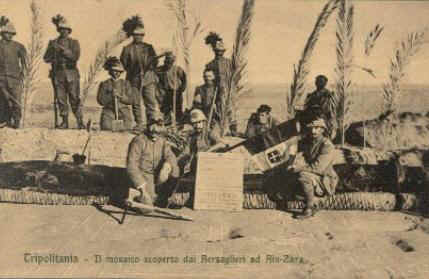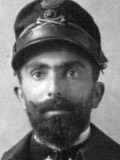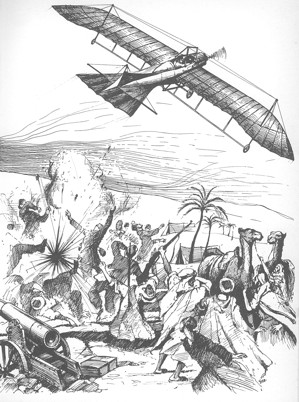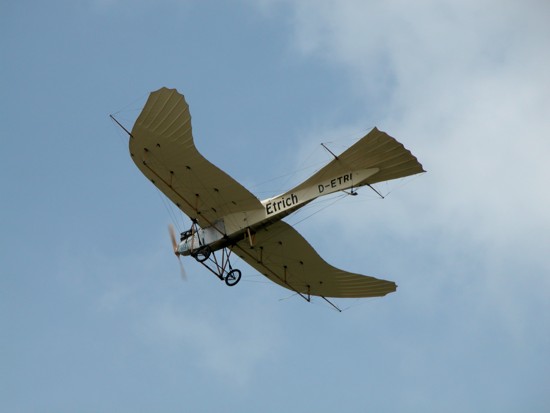The attack of Oct. 23 was followed three days later by another. The Turks and Arabs who attacked in the eastern oasis were beaten off after some hours' fighting, but south of the town the line was rushed by a large body of Arabs who penetrated into the gardens and were dislodged with difficulty by the reserves.  For a short time the situation was anxious, but after about five hours' fighting the attacking tribesmen were driven off, leaving many dead. This fight showed that the line occupied was too long for the number of troops available, and it was reduced in extent by a considerable withdrawal in the eastern oasis. This withdrawal was made the subject of alarmist rumours in the European press and many thought that Tripoli would shortly be retaken; and the United States cruiser" Chester
For a short time the situation was anxious, but after about five hours' fighting the attacking tribesmen were driven off, leaving many dead. This fight showed that the line occupied was too long for the number of troops available, and it was reduced in extent by a considerable withdrawal in the eastern oasis. This withdrawal was made the subject of alarmist rumours in the European press and many thought that Tripoli would shortly be retaken; and the United States cruiser" Chester  "was sent with orders to embark the American consul and any other American subjects. The consul declined to go, and his action was of value in indicating the true situation. No doubt, in addition to frightening Europe, the withdrawal encouraged the Turks and Arabs, who appeared to be in the position of besieging Tripoli. For a month the town did give the impression of being beleaguered; in reality, during this period, Gen. Caneva's chief enemy was cholera.
"was sent with orders to embark the American consul and any other American subjects. The consul declined to go, and his action was of value in indicating the true situation. No doubt, in addition to frightening Europe, the withdrawal encouraged the Turks and Arabs, who appeared to be in the position of besieging Tripoli. For a month the town did give the impression of being beleaguered; in reality, during this period, Gen. Caneva's chief enemy was cholera. 
 For a short time the situation was anxious, but after about five hours' fighting the attacking tribesmen were driven off, leaving many dead. This fight showed that the line occupied was too long for the number of troops available, and it was reduced in extent by a considerable withdrawal in the eastern oasis. This withdrawal was made the subject of alarmist rumours in the European press and many thought that Tripoli would shortly be retaken; and the United States cruiser" Chester
For a short time the situation was anxious, but after about five hours' fighting the attacking tribesmen were driven off, leaving many dead. This fight showed that the line occupied was too long for the number of troops available, and it was reduced in extent by a considerable withdrawal in the eastern oasis. This withdrawal was made the subject of alarmist rumours in the European press and many thought that Tripoli would shortly be retaken; and the United States cruiser" Chester  "was sent with orders to embark the American consul and any other American subjects. The consul declined to go, and his action was of value in indicating the true situation. No doubt, in addition to frightening Europe, the withdrawal encouraged the Turks and Arabs, who appeared to be in the position of besieging Tripoli. For a month the town did give the impression of being beleaguered; in reality, during this period, Gen. Caneva's chief enemy was cholera.
"was sent with orders to embark the American consul and any other American subjects. The consul declined to go, and his action was of value in indicating the true situation. No doubt, in addition to frightening Europe, the withdrawal encouraged the Turks and Arabs, who appeared to be in the position of besieging Tripoli. For a month the town did give the impression of being beleaguered; in reality, during this period, Gen. Caneva's chief enemy was cholera. 
The disease broke out towards the end of Oct. and for some weeks it caused much loss and still more anxiety. In all, nearly a thousand soldiers died of cholera, and the native population suffered heavily. The problem of tackling the epidemic was rendered more difficult by the large number of" immigrants "from the oasis, who had sought refuge in the town in the early days of the occupation, or had been brought in when the oasis was cleared. Prompt and effective measures were taken, but it was not until the middle of Nov. that the authorities could breathe freely, and for some weeks the situation required vigilance.

From the events of Oct. 23 and the following days it was clear that the calculations of the Italian Government had been at fault. Turkey was not prepared to lose the Tripolitan provinces without a struggle, and the local tribesmen were joining in the resistance of the garrison. Reinforcements were immediately dispatched to Tripoli, and on Nov. 5 a decree was published in Rome, annexing the two Turkish provinces. Italy was no longer inclined to consider a compromise, and the annexation was proclaimed in order to stop all efforts in that direction and define her intentions, not only to Turkey, but to the European Powers.
Further reinforcements followed, and by the fourth week in Nov. Gen. Caneva had under his command 34 battalions of infantry (nearly 25,000 rifles) and 16 batteries of field and mountain artillery. On Nov. 26 an advance was made through the oasis on the east and the old lines were occupied after stiff fighting.
had under his command 34 battalions of infantry (nearly 25,000 rifles) and 16 batteries of field and mountain artillery. On Nov. 26 an advance was made through the oasis on the east and the old lines were occupied after stiff fighting.  Eight days after, on Dec. 4, a force of 12,000 men, with five mountain batteries and two squadrons, supported from the trenches by field guns and a few heavy guns which had arrived some days earlier, advanced into the plain against the main body of the enemy, which was based upon the little oasis of 'Ain Zara
Eight days after, on Dec. 4, a force of 12,000 men, with five mountain batteries and two squadrons, supported from the trenches by field guns and a few heavy guns which had arrived some days earlier, advanced into the plain against the main body of the enemy, which was based upon the little oasis of 'Ain Zara . It was hoped that the Turks would stand, but this was not their policy. They fought a stubborn containing action, and lost the few guns they possessed, but they retreated in good time, leaving to the quick-moving tribesmen the task of delaying the Italian advance.
. It was hoped that the Turks would stand, but this was not their policy. They fought a stubborn containing action, and lost the few guns they possessed, but they retreated in good time, leaving to the quick-moving tribesmen the task of delaying the Italian advance.  'Ain Zara was occupied in force by the Italians, and Turkish headquarters were established at 'Aziziya, some 30 m. south of Tripoli, while a strong force, mainly Arab, was encamped at Suani Beni Adham, a day's march from the town. The eastern oasis was deserted by the Arabs, and its farthest point, Tajura, was occupied by the Italians on Dec. 13.
'Ain Zara was occupied in force by the Italians, and Turkish headquarters were established at 'Aziziya, some 30 m. south of Tripoli, while a strong force, mainly Arab, was encamped at Suani Beni Adham, a day's march from the town. The eastern oasis was deserted by the Arabs, and its farthest point, Tajura, was occupied by the Italians on Dec. 13.


 had under his command 34 battalions of infantry (nearly 25,000 rifles) and 16 batteries of field and mountain artillery. On Nov. 26 an advance was made through the oasis on the east and the old lines were occupied after stiff fighting.
had under his command 34 battalions of infantry (nearly 25,000 rifles) and 16 batteries of field and mountain artillery. On Nov. 26 an advance was made through the oasis on the east and the old lines were occupied after stiff fighting.  Eight days after, on Dec. 4, a force of 12,000 men, with five mountain batteries and two squadrons, supported from the trenches by field guns and a few heavy guns which had arrived some days earlier, advanced into the plain against the main body of the enemy, which was based upon the little oasis of 'Ain Zara
Eight days after, on Dec. 4, a force of 12,000 men, with five mountain batteries and two squadrons, supported from the trenches by field guns and a few heavy guns which had arrived some days earlier, advanced into the plain against the main body of the enemy, which was based upon the little oasis of 'Ain Zara . It was hoped that the Turks would stand, but this was not their policy. They fought a stubborn containing action, and lost the few guns they possessed, but they retreated in good time, leaving to the quick-moving tribesmen the task of delaying the Italian advance.
. It was hoped that the Turks would stand, but this was not their policy. They fought a stubborn containing action, and lost the few guns they possessed, but they retreated in good time, leaving to the quick-moving tribesmen the task of delaying the Italian advance.  'Ain Zara was occupied in force by the Italians, and Turkish headquarters were established at 'Aziziya, some 30 m. south of Tripoli, while a strong force, mainly Arab, was encamped at Suani Beni Adham, a day's march from the town. The eastern oasis was deserted by the Arabs, and its farthest point, Tajura, was occupied by the Italians on Dec. 13.
'Ain Zara was occupied in force by the Italians, and Turkish headquarters were established at 'Aziziya, some 30 m. south of Tripoli, while a strong force, mainly Arab, was encamped at Suani Beni Adham, a day's march from the town. The eastern oasis was deserted by the Arabs, and its farthest point, Tajura, was occupied by the Italians on Dec. 13.


Giulio Gavotti was one of the pioneers of aviation and maybe the first flyer in a war
born 17 ottobre 1882 . In November 1910 he was awarded a pilots brevet and flew a Farman plane
In 1911 at Ain zara he launched a grenade on the turk army
This is believed to be the first action in war while flying a plane
No comments:
Post a Comment